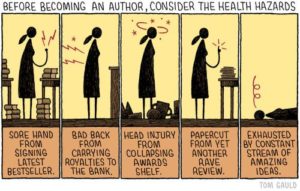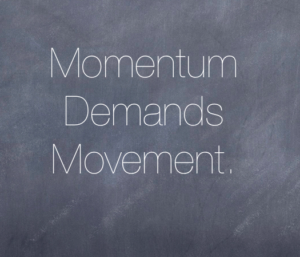I’ve blogged on the Fictorians before about the infection that nearly killed me in 2014. What I may not have mentioned that outside of that scary situation and hospital stay, it really wrecked my writing momentum. This was February 2014. If we rewind back to mid-2013, I went into the most productive period of my writing at that point. From July 2013 to January 14, I wrote two novels. I wrote what became my debut novel SLEEPER PROTOCOL and another shorter novel that’s my tribute to Elmore Leonard called SUPER SYNC. In that six month period, I also wrote a few short stories and my overall total of words written was probably somewhere near 180,000. This was an incredible time and I really felt like I was getting into a higher gear when everything came crashing down.
After my illness, I barely wrote anything new for a year. Yes, I sold and went through subsequent edits on both SLEEPER PROTOCOL and an earlier novel RUNS IN THE FAMILY, so I was “writing” but I wasn’t writing anything new, which we all know are two entirely different things. But, in that period from April 2015 to January 2016 came the impetus for the sequel VENDETTA PROTOCOL and I decided to try my hand at a prequel to RUNS IN THE FAMILY. Writing was slow and arduous. There were several times when I wanted to simply give up. I was going to publish a novel, after all. I ultimately decided that I wasn’t going to be happy with one book on that shelf by my deathbed. It was time to write more, so in January 2016, I decided that it was time to get off my ass and write. I’d been incredibly productive before then, and I believed I could get back to, or surpass, my productivity. It just required self-discipline to get into the chair and write and a little faith that I would get better, both mentally and physically.
It was slow going at first, but I outlined an alternate history novel. From there, I went into the draft of VENDETTA PROTOCOL with the goal of writing it in three months. SLEEPER PROTOCOL took me 7 weeks and I figured I would need about double the time. Turns out, I wrote VENDETTA PROTOCOL in 9 weeks. Because I could feel myself getting faster and I trusted myself as a writer. Was it perfect? Hell, no. But I was getting it out of my head. I turned around from that draft and wrote a novella LANCER ONE. After that, I was asked to submit to a military science fiction anthology, so I wrote a 9,000 word story “Stand On It.” At the end of 2016, I started work on the alternate history novel I’d outlined in February-March. I worked on that draft into February of 2017.
Not long after I finished that project, my military science fiction anthology story turned into a novel titled PEACEMAKER. I wrote that novel in less than three months. During that time, I was asked on short notice to provide a story for the upcoming X-PRIZE: Avatars anthology. I had to turn it around in two weeks – I did it in a week. All of that “new writing” ended back in June of this year. I’ve been editing ever since. The results are crazy.
PEACEMAKER get worldwide release on August 25th. VENDETTA PROTOCOL gets an ebook release on September 13th and a print version following. The novella LANCER ONE is due out in October. The first anthology A FISTFUL OF CREDITS was released in June and is selling like hotcakes. The X-PRIZE anthology is due later this year.
Two weeks ago, I turned in the alternate history project to my editor/mentor. It’s the most difficult book I’ve written to date. I’ve now laid out a plan for the rest of 2017 and it’s ambitious as hell. I can get it done, though. My momentum is back. How did I do it?
Go back a few paragraphs. For me, it’s about putting my butt in the chair and writing. Yes, I plot and outline, but I’m also thinking about the books and projects all the time. I take a lot of notes. Some of them work, others don’t. The best ideas I don’t have to write down because they stay with me. Once I’m committed to writing the project, I let go of my inner critic – that little bastard that likes to click the backspace button more than he types. I write because I know that I can fix it later. I get the story out of my head. If it comes in short or over the desired word count, I go back and fix it. All of that is faith in myself. Will I make mistakes? Yes. Can I fix them? Yes. I’ve taken very strongly to the belief that I can fix anything in editing. The result is my productivity is higher than ever.
Let go. Have faith. Write.



 One of my many medical issues involves a common writer’s ailment – carpal tunnel. When I first started getting it I did what most folks do: I ignored it. Then it evolved from a single soldier to a tank battalion running over my wrists every time I typed more than a page.
One of my many medical issues involves a common writer’s ailment – carpal tunnel. When I first started getting it I did what most folks do: I ignored it. Then it evolved from a single soldier to a tank battalion running over my wrists every time I typed more than a page.


